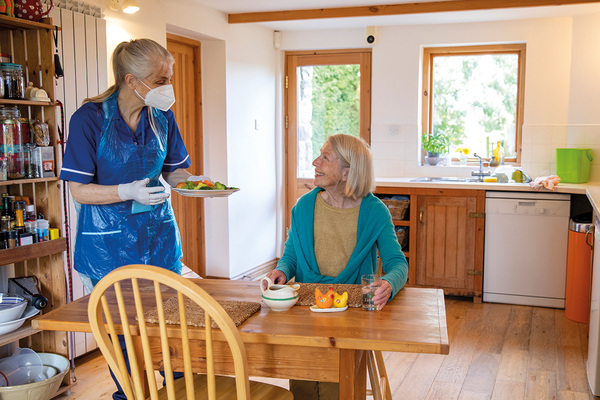You are viewing 1 of your 1 free articles

Jules Birch is an award-winning blogger who writes exclusive articles for Inside Housing
The overarching aim of the health and social care plan is to protect property wealth
The new hike in national insurance will see a poorer, younger generation pay to protect the property wealth of those better off. But perhaps that was the point, writes Jules Birch
Boris Johnson has broken all kinds of election promises in his announcement on health and social care levy, but for housing purposes there is one pledge which remains front and centre.
Amid the wreckage of the triple locks on pensions and tax rates, it’s a survivor of the sunlit days of July 2019 when the new prime minister stood outside Number 10 and said: “My job is to protect you or your parents or grandparents from the fear of having to sell your home to pay for the costs of care. And so I am announcing now on the steps of Downing Street that we will fix the crisis in social care once and for all with a clear plan we have prepared to give every older person the dignity and security they deserve.” Note the order of priorities.
It was also there in the Conservative manifesto in December, even though the “clear plan” had become a somewhat vaguer aspiration for a cross-party consensus. The significant bit came next: “That consensus will consider a range of options, but one condition we do make is that nobody needing care should be forced to sell their home to pay for it.”
And it’s there front and centre in the plan announced this week for a new £86,000 cap on the amount that anyone in England will have to spend on their personal care costs.
There are still some big caveats to mention – not least that the cap does not include accommodation costs and that social care comes after the NHS in the queue for cash – but the net effect should still be that people get to keep far more of their housing wealth and pass it on to their children and grandchildren.
Yet when we consider the details of the health and social care levy that will pay for it all, it’s striking that one category of assets and income is left completely untouched.
As many Conservative MPs complained in advance, the headline increase in national insurance (NI) contributions means that people of working age will pay more in tax so that older people can pay less for their care (although that ignores the many younger people who need care, too).
That point has been partially addressed by levying the tax on income earned by people above pensionable age as well, but that effectively means pensioners who have to work will pay for the care of those who do not.
Tax on share dividends will also be increased in a last-minute attempts to appease critics, but that looks more like a way to stop business owners avoiding the increase in NI than anything more substantial.
Millions of low earners, including care workers and all those others who were essential during the pandemic, will be paying more in NI. They include around two million families who already face losing £1,000 a year in Universal Credit but will now pay another £100 a year in tax on top of that.
These low-paid workers will also be far less likely to own their own home or have parents and grandparents who do. That makes the unfairness as much intra-generational as inter-generational – they will be paying more in tax to protect the housing-based inheritances of their contemporaries.
The tax increase also applies to NI paid by employers and, while the Treasury said it will cover the increased cost to the public sector, that presumably means it will still apply to care homes run by the private sector and social housing providers, eating into whatever funding for social care reform is left.
So what’s missing from the tax take? First, rental income received by landlords, which is subject to income tax but not NI.
Second, wealth in general and property wealth in particular, with no move to increase capital gains and other taxes.
“Surely the fairest way to share the risk to housing inheritances would have been to increase inheritance tax across the board?”
As proposed, the new social care policy also does the opposite of levelling up. Subject to the caveats above, the £86,000 cap on care costs is worth a lot more to someone who stands to inherit a house in the South East worth £1m than one in the North East worth £200,000. This will be only partially offset by the increased floor for assets you can have before means testing kicks in.
The government is rightly addressing the unfairness of a care lottery in which some older people with conditions such as dementia can be forced to sell their homes to pay for their social care while the rest get their healthcare for free.
As chancellor Rishi Sunak put it at the launch of the policy: “Instead of individuals having to bear the financial risks of catastrophic care costs themselves, we as a country are deciding to share more of that risk collectively.”
But surely the fairest way to share the risk to housing inheritances would have been to increase inheritance tax across the board? Instead, the government has done the opposite.
Following a Conservative manifesto pledge in 2015, then-prime minister David Cameron and then-chancellor George Osborne increased the threshold for inheritance tax on main homes from £650,000 to £1m.
That huge tax break for homeowners and their children cost £1bn in 2017, while everyone else was facing austerity. Soaring house prices over the past four years means that reversing it would raise a lot more for social care now.
But there was never any realistic change of that happening and the result is yet more government support for those rising prices.
This may not come as startling news to anyone working in housing, but the bung to wealthy homeowners then and the arrangements for the health and social care levy now demonstrate only too clearly that the overwhelming priority for the Conservatives is to protect property wealth.
Jules Birch, columnist, Inside Housing
Sign up for our care and support bulletin
Already have an account? Click here to manage your newsletters












